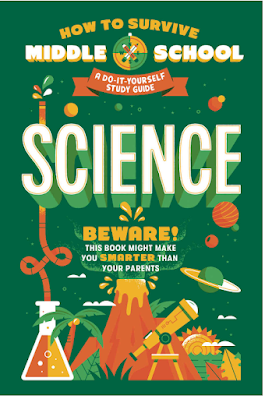This post contains Amazon affiliate links.
Everything You Need to Ace Science in One Big Fat Notebook by Michael Geisen
This book covers literally EVERYTHING including scientific investigation; matter, chemical reactions, and solutions; human body and body systems; biological classification and cells; and so much more! It's written in a kid-friendly style and language and has lots of easy to understand illustrations. There are also lots of fun little 'knowledge checks' (that are like quizzes) with answers on the next page so students can check their answers. This would be a fun activity for early finishers; you could have them write the answers on a separate paper and test their knowledge.
You can check out this book here.
Human Body Theater by Maris Wicks
As you can tell by the title, this book is about the human body systems. If you teach about the body systems, this book is WONDERFUL! It is written in a comic book style and includes information about all 5 senses and has a glossary at the end. It covers all 10 body systems as well as an introduction on cells and how they pertain to the human body. This book has funny captions and kid-friendly descriptions.
You can check out this book here.
Sciencesaurus Student Handbook by Holt McDougal
This book is another great resource to have in your science classroom. It is like a miniature textbook with topics divided into sections and subsections with a glossary and table of contents. The book has pretty much every topic taught in middle school and then some. You could use this book for early finishers or as a resource for students who are struggling to grasp concepts.
You can check out this book here.
Ask Your Science Teacher: Answers to Everyday Questions by Larry Scheckel
This book is perfect for those students who are always asking obscure off-topic questions. We've all had those students... you really want to answer the question because they're showing curiosity but don't have time or just plain don't know the answer! Questions like, What makes our eyes twitch? or How do glow-in-the-dark objects work? Those are just 2 of the 250 questions answered in this book. You could even create writing prompts from these questions or have students summarize what they've read. This is a great book to incite student curiosity!
You can check out this book here.
Knowledge Encyclopedia Science! by DK
This is another great reference book for your science classroom that covers many topics. It is illustration-heavy with tons of captions so students don't get overwhelmed with reading paragraph after paragraph. This book does a nice job of breaking down concepts with visuals which might benefit struggling students.
You can check out this book here.
How to Survive Middle School: Science: A Do-It-Yourself Study Guide by Rachel Ross, Maria Ter-Mikaelian, & Ilse Ortabasi
This book is a great resource for not only struggling students but also for early finishers who like learning new concepts about science. It includes information on lots of different concepts that are broken up nicely with wonderful illustrations. The book also has activities and questions that are answered within each section so students can check their level of understanding. Each chapter also has a vocabulary list of definitions.
You can check out this book here.
Science Encyclopedia: Atoms Smashing, Food Chemistry, Animals, Space, and More! by National Geographic Kids
Let me start off by saying... anything by National Geographic Kids is AMAZING!! Don't let the topics in the title fool you. There is SO much more than just what is listed there. In true National Geographic fashion, the photos and illustrations are beautiful! This book also gives a list of websites, films and shows, and books where students can go to learn more about anything science related. Even though this is geared towards 'kids', it is well-suited for middle school.
You can check out this book here.
I hope you get a chance to check out some of these books! They can be a wonderful supplement to your middle school science classroom. Let me know in the comments if you have other books to add to this list. I'd LOVE to hear from you!









In science class, important books often include On the Origin of species by Charles Darwin, which revolutionized biology with the theory of evolution. Isaac Newton's Principia mathematica laid the groundwork for classical mechanics and modern physics. Rachel Carson's Silent spring ignited the environmental movement, raising awareness about the impact of pesticides. Albert Einstein's Relativity: The special and general theory reshaped our understanding of space, time, and gravity. The Double helix by James Watson provides insight into the discovery of the structure of DNA, marking a pivotal moment in genetics and molecular biology.
ReplyDelete